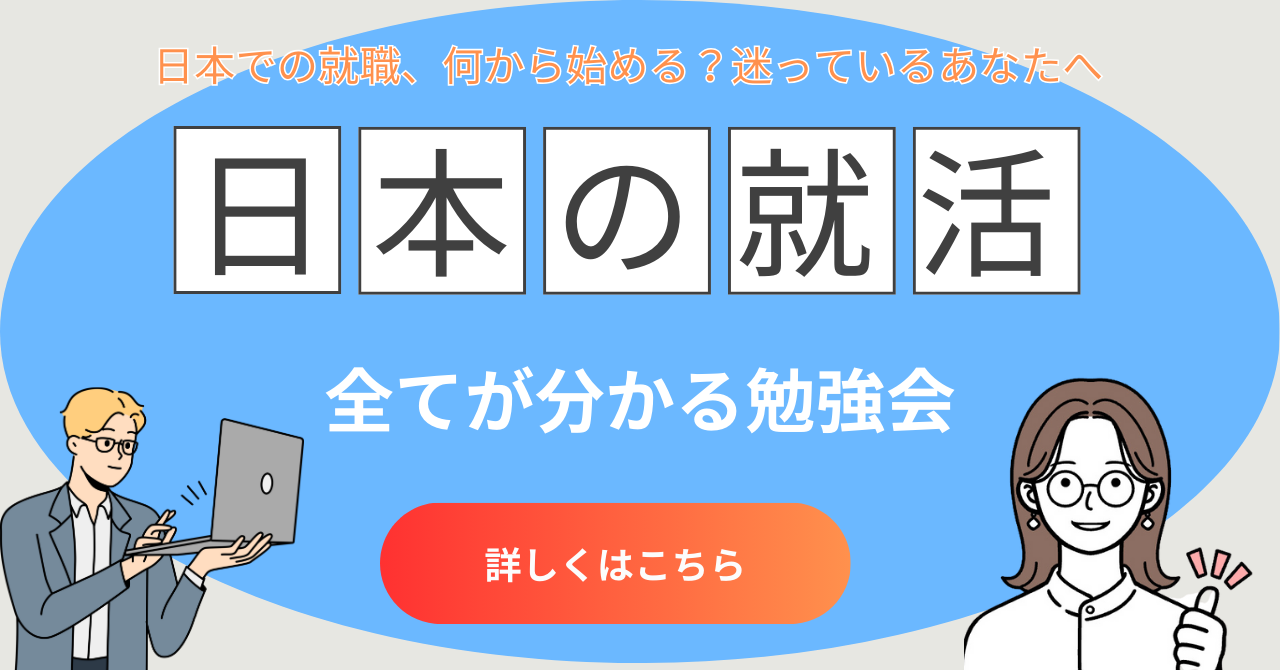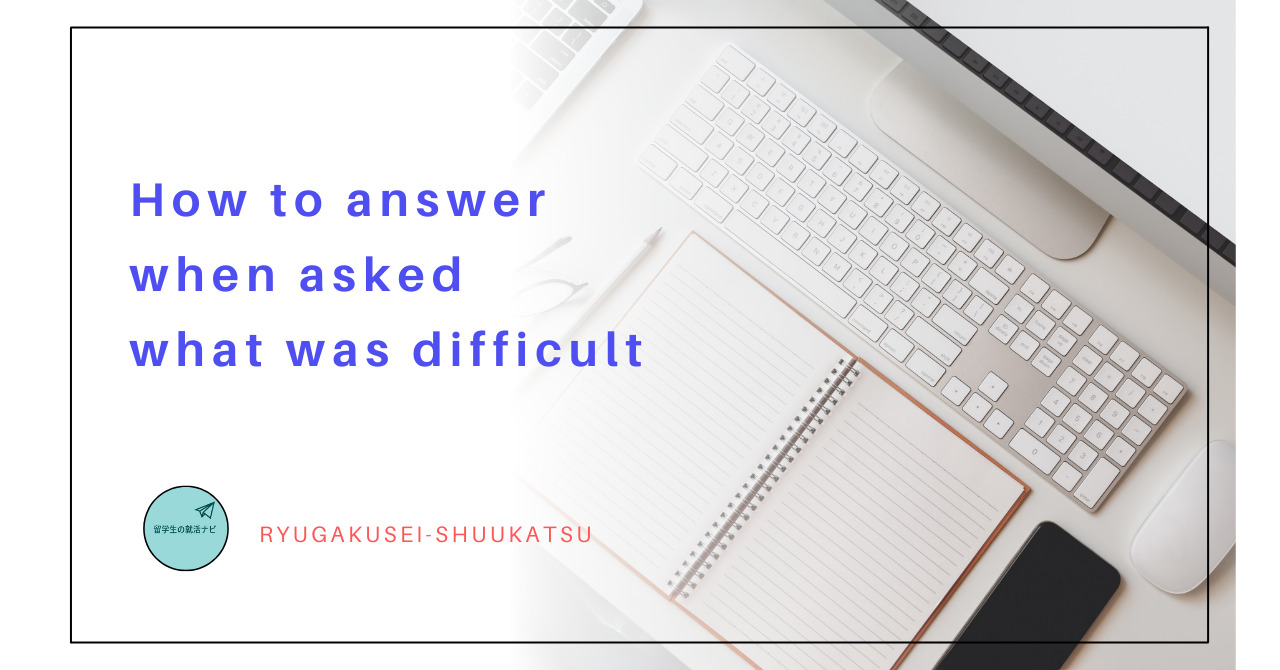
I struggled to answer when I was asked about challenges during an interview. I wasn’t sure how to respond to that question.

I have lived a normal life so far, so I have not had any difficulties.
I answered “nothing in particular” during the interview.

就活ナビ
I know what it’s like to be asked about something that was difficult and to feel rushed.
In this article, I will give you all the tips and tricks on how to answer the question “what was difficult” that will be appreciated by the interviewer.
In addition, we will introduce what international students who do not have a “difficult experience” should do.
If you want to make a difference in the interview process, please read this article to the end.
- Intent to ask “what was difficult”
- How to Write “What Was Difficult?”
- Examples of “difficulties
- Notes on answering the question, “What was difficult?”
- (3): Not conveying your own personal twist on the “difficulties.”
- Recommended measures for international students who cannot answer “what was difficult” well.
Intent to ask “what was difficult”
Intention of asking “what was difficult” (1): To confirm whether the applicant has had experience in striving for a goal.
The first intention of asking “what was difficult” is to see if you have experienced a goal-oriented effort.
If you don’t challenge yourself to do something, you will not be in a difficult situation.
On the way of trying hard with a goal, you will overcome or give up on a difficult situation.
Therefore, by asking about things that were difficult, the interviewer is checking to see if you have ever made an effort with a goal in mind.
Interviewer then determine if the applicant is someone who can work hard to achieve his or her goals after joining the company.
Intention of asking “what was difficult” (2): To confirm how the difficulties were overcome.
The second purpose of asking about difficulties is to see how you overcame them.
Many students, when asked about a difficult experience, will try their best to describe the difficult situation.
However, the interviewer wants to know how you overcame the difficulty rather than the situation.
By asking students how they overcame difficulties, they are confirming their human nature and thought process.
Therefore, it is necessary to confirm whether the way of thinking and values that emerged in the face of difficulties match the kind of person the company is looking for.
How to Write “What Was Difficult?”
How to write “What was difficult” (1): Conclusion
The first way to write about a “difficult experience” is to tell the conclusion.
It is important to tell the conclusion in order for the interviewer to understand your “difficulties” in an easy-to-understand manner.
When answering the question “what was difficult” in an interview, you should say something like, “What was difficult was 0. The first step is to write a conclusion.
How to write “What was difficult” (2): Explain the difficult situation.
The second way to write “what was difficult” is to briefly describe the difficult situation.
Explain in detail what the situation was and what problems arose.
It is important to convey your awareness of the difficult situation or problem.
How to write “What was difficult” (3): Tell your own ingenuity.
The third way to write “what was difficult” is to tell about your own innovations.
Tell specifically “what you devised in your own way” and “how you acted” to overcome the difficulty.
By telling how you acted in the face of difficulties, you can show the thinking and humanity behind your actions.
It is important to be as specific as possible in describing how you overcame difficulties.
For example, if you tell them, “I worked very hard to overcome difficulties,” they will not be able to visualize how you did your best.
Therefore, you should write specifically about how you overcame the difficulties.
How to Write “What Was Difficult” (4): Explain the results and lessons learned.
The fourth way to write “what was difficult” is to explain the results and what you learned after overcoming the difficulties.
By overcoming difficulties, you can convey “what you learned and how you grew.
You can also show the changes you made after overcoming difficulties and the contributions you made to those around you.
Examples of “difficulties
困難だったことは、大学院の試験に落ちたことです。 私は日本語学校に一年間通いながら、〇〇大学院の試験を受けました。 しかし、〇〇大学院の試験に不合格になりました。
そこで、私は日本語学校を半年延長しながら、〇〇大学院の試験をもう一度受けることにしました。 半年後に〇〇大学院に受かるために、不合格を反省しながら、改めて勉強計画を立てていました。
苦手な項目である小論文を克服するために、毎週一本は小論文を書いて日本語の先生に添削してもらえました。 また、〇〇大学に合格した先輩に基礎知識や受験対策を教えてもらえました。
結果として、〇〇大学院の受験に合格できました。 この経験から失敗したことを反省し、改善対策を取ることの大事さを学びました。
困難だったことは、日本語の会話力を上げることです。
私は日本語学校で日本語を勉強しましたが、日本語でうまく会話できず、困っていました。
そこで、私は日本語の会話力を上げるために、アルバイトを始めたり、日本人の友達を作ったりしました。 まずは居酒屋でキッチンスタップとしてスタートし、日々の業務や日本語を覚えていました。
さらに日本語の会話力を伸ばすために、ホールスタップとしてお客様とコミュニケーションを取っていました。
また、日本人の友達を作って一緒に遊んだり、お互いに勉強したりしました。
その結果、半年後に日本語で日常会話ができるようになりました。日本語の先生にも「日本語が上達できたね」と言われました。
Notes on answering the question, “What was difficult?”
(1): nothing in particular
The first point to keep in mind when answering the “difficulties” question is not to answer “nothing in particular.
By asking “what was difficult,” the interviewer is confirming your ability to overcome difficulties and your character.
However, if you answer “I have never had any difficulties” in an interview, you will receive a negative evaluation.
In an interview, it is important to show yourself by answering the interviewer’s questions.
If you answer “nothing in particular” in an interview, you are missing an opportunity to show your ability to overcome difficulties and your own personality.
(2) Do not over-explain difficult situations.
The second thing to keep in mind when answering the question “what was difficult” is not to over-explain the difficult situation.
Simply describing a difficult situation in an interview is not appealing.
When you are asked about “difficulties” in an interview, it is important to tell how you overcame the difficulties rather than the circumstances of the difficulties.
Through the process of overcoming difficulties, show your humanity and values.
(3): Not conveying your own personal twist on the “difficulties.”
The third point to keep in mind when answering about what was difficult is that you do not tell them about your own innovations.
Especially when conveying an experience in which you worked hard as a team to overcome a difficulty, it is important to be specific about how you did your best.
For example, if you say, “It was difficult for us to win the championship in the 00 tournament, but our team members worked hard and we won the championship,” you are not appealing your own ingenuity.
By giving specific details of how you acted to overcome difficulties, you can show your way of thinking and your personality.
Recommended measures for international students who cannot answer “what was difficult” well.
Many international students may have trouble answering well when asked about difficulties they have had during interviews.
The following is an explanation of what you should do in order to be able to answer well about your difficulties.
Countermeasure 1: Have others correct the draft of what was difficult.
The first thing you should do in order to be able to answer well about your difficulties is to have someone else correct the draft of your difficulties.
It is not easy for international students to communicate their difficulties in Japanese in an easy-to-understand manner.
Therefore, by having someone else correct the draft you wrote, you can make your answers easier to understand.
When you create “answers that will be evaluated by interviewers” from scratch by yourself, it takes a lot of time and energy, so it is recommended to have someone else correct your answers.
Countermeasure 2: Practice speaking in your own words.
The second thing you should do to be able to answer well about the difficulties you had is to practice speaking in your own words.
If you speak what you have implicitly said in the interview, it will give a negative impression to the interviewer.
Therefore, practice so that you can speak in your own words, rather than reading the draft of “what was difficult” that you were given to correct.
Countermeasure 3: Have an employment agent practice interviews.
The third thing you should do to answer well what was difficult for you is to have an employment agent practice your interview.
Employment agents do not introduce you to companies, but rather correct your ES and help you prepare for interviews.
Ask the employment agent to practice interviews and put “difficulties” on the list of questions you want them to ask.
The employment agent will give you feedback on your answers so you can find areas for improvement.
Finally、To all international students, the most important factor when seeking employment in Japan is mastering the Japanese language. Smooth communication in Japan’s workplace environment and society relies on using the right words to express yourself effectively. Furthermore, having strong Japanese language skills provides advantages in various situations, from selecting job opportunities to interviews and actual job tasks. By enhancing your Japanese language proficiency, you can approach your work with confidence.
offers a solution to the language barrier faced by international students during job hunting by providing a free Japanese conversation room exclusively for foreign students. If you’re interested in learning Japanese, we encourage you to join us. Please feel free to participate!



